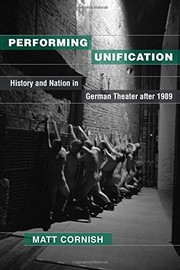- Summary
- "Since the moment after the fall of the Berlin Wall in 1989, the most important German theater artists have created plays and productions about unification. Some have challenged how German history is written, while others opposed the very act of storytelling. Performing Unification examines how German directors, playwrights, and theater groups including Heiner Müller, Frank Castorf, and Rimini Protokoll have represented and misrepresented the past, confronting their nation's history and collective identity. While scholars and critics have scrutinized unification in cinema and literature, this is the first book to focus on theater and performance. Author Matt Cornish surveys German-language history plays from the Baroque period through Friedrich Schiller, Heinrich von Kleist, Brecht, and up to the documentary theater movement of the 1960s to show how German identity has always been contested, even well before Germany became a nation. Then turning to performances of unification after 1989, Cornish argues that theater, in its structures and its live gestures, on pages, stages, and streets, helps us to understand the past and its effect on us, our relationships with others in our communities, and our futures. Engaging with theater theory from Aristotle through Bertolt Brecht and Hans-Thies Lehmann's "postdramatic" theater, and also with theories of history from Hegel to Walter Benjamin and Hayden White, Performing Unification demonstrates that historiography and dramaturgy are intertwined." -- Publisher's description
- Format
- Book
- Author/Creator
- Cornish, Matt, author.
- Published
- Ann Arbor : University of Michigan Press, [2017]
©2017
- Locale
- Germany
- Contents
-
Prologue: Berlin, Alexanderplatz
History and nation in German drama before 1989
Unification as drama
Western playwrights and counternarratives of unification
Allegory and antiallegory in the Ost
Eastern directors and postdramatic historiography
Performing archives and museums in the Freie Szene
Epilogue: hybridized history.
- Notes
-
Includes bibliographical references and index.
Prologue: Berlin, Alexanderplatz -- History and nation in German drama before 1989 -- Unification as drama -- Western playwrights and counternarratives of unification -- Allegory and antiallegory in the Ost -- Eastern directors and postdramatic historiography -- Performing archives and museums in the Freie Szene -- Epilogue: hybridized history.




